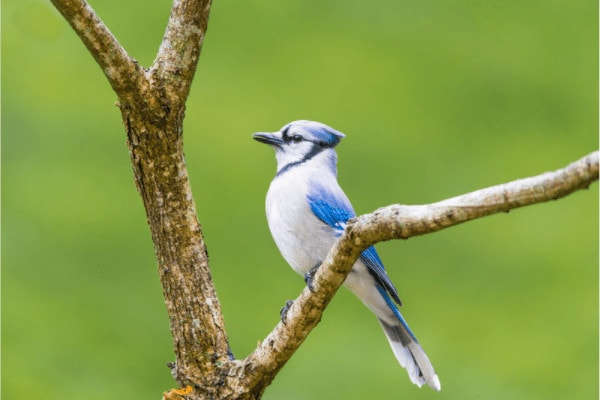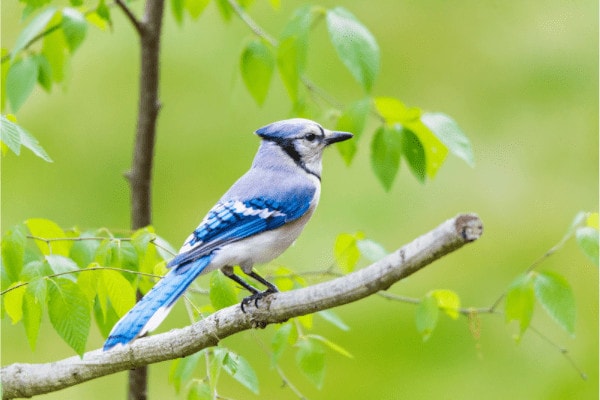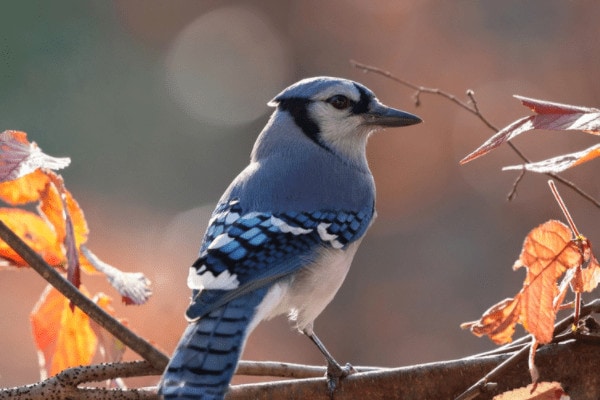Contents
- Mounting A Territorial Defense: Blue Jays Will Stop At Nothing To Protect Their Home Turf
- Last Line Of Defense: Keeping Their Young Hatchlings Safe With Hostile Defensive Strategies
- Raptor Calls: Tricking Other Birds By Mimicking These Terrifying Predators
- Visceral Screaming: The Reasoning Behind Such An Antagonistic Maneuver
- Guarding Their Nest Eggs: Working Diligently To Protect Unborn Hatchlings
- Final Thoughts About Why Blue Jays Are Aggressive
After seeing blue jay birds attack unsuspecting songbirds for the thousandth time, I finally couldn’t handle it any longer. I’ve always wondered why these beautiful bullies were so mean and aggressive toward other birds, animals, and people. I was shocked to learn the truth, so if you’re curious and don’t mind reading along, I’ll share my unexpected findings with you now.
Blue jays are prey to hawks, eagles, and vultures and aggressively fight back in self-defense. They’re noisy for protective purposes. They’re territorial and ferociously defend their homes. They viciously raid nests and steal eggs to feed their young. And they mob birds trying to eat from their feeders.
And I’ve barely begun unraveling this mystery!
Are blue jays aggressive? Absolutely. They’re also hunted each and every day.
I’ve further unraveled the reasons behind blue jay’s aggressiveness. Believe it or not, there’s more to the story than meets the eye.
A few other key issues that I’ll talk about include:
- Mounting a territorial defense
- Feeding and caring for their young
- Mimicking raptor calls to trick other birds
- Screaming when their territory is under attack
- Defending blue jay eggs from other birds and vicious ground dwelling predators
Will you continue learning more about these beautiful mysterious winged creatures?
Let’s dive in right away.

Mounting A Territorial Defense: Blue Jays Will Stop At Nothing To Protect Their Home Turf
There is no denying that blue jays are aggressive and vicious. But I think they get a bad rap because they’re also constantly being threatened by other birds and small creatures.
Picture this:
A mob of blue jays decides to designate your backyard as their territory.
They begin nesting in your trees or birdhouses and they regularly eat from your bird feeders while aggressively keeping other small birds at bay.
Guess what? Now that they consider your backyard to be their territory, they will stop at nothing to protect and defend their new turf.
If this bothers you, you’ll need to take steps to dissuade these blue jays from considering your backyard their home.
But at the same time…
Raptor birds including hawks, falcons, owls, and eagles are bigger so they’re constantly trying to steal from blue jays and encroach upon their territory.
As you can imagine, this keeps the blue jays on the defensive all day long.
If an owl begins nesting in your backyard during the day, a group of blue jays will mob the owl and harass it until it flies away and decides to nest somewhere else outside of its territory.
The same holds true for ground-dwelling predators like snakes, squirrels, raccoons, possums, and cats that attempt to steal their young, steal eggs from their nests, and ultimately steal their food from backyard bird feeders in their territory.
They do not act kindly to these predators intruding on their home turf. Again, they will come together in a mob and make loud screeching noises and fly directly toward these predators in droves to scare them away for good.
Do you want constant intruders harassing you in your home? Maybe these aggressive blue jays have the right to defend themselves.
Last Line Of Defense: Keeping Their Young Hatchlings Safe With Hostile Defensive Strategies
Here’s the problem with blue jays…
From what I can tell, these large birds get a bad rap because they aren’t willing to share with smaller birds. They take advantage of them and keep them away from bird feeders and other easy meals.
Is this the right thing to do? Obviously, this is what nature intended otherwise it wouldn’t happen. So, it really isn’t a matter of right or wrong.
Now:
After these birds claim a particular territory, they band together and act aggressively and make loud and screeching noises to scare other animals and birds away.
These birds seem like real jerks because of it, but they ultimately perform these acts because they’re trying to keep their young hatchlings safe and sound.
Think about it…
If you were in your backyard playing catch with your 5 and 7-year-old kids, and a black bear suddenly appeared, you’d immediately take action, right? You would go into berserker mode to protect your kids.
More than likely, you would start waving your arms around and screaming at the top of your lungs to scare the black bear away. And 99 times out of 100, the screaming and aggressive movements would work to frighten the bear.
Basically…
Blue jays do the same thing to keep their family safe. They may seem like vicious jerks and this is partly true, but they also have many other predators trying to snatch up their young and eat their babies right out of the nest.
It’s got to be very scary for these blue jays to say the least.

Raptor Calls: Tricking Other Birds By Mimicking These Terrifying Predators
Have you wondered why blue jays might mimic raptor calls?
It’s fairly simple and straightforward enough.
Blue jays mimic these calls to frighten predators away. They also mimic these calls to scare other birds away and take advantage of the opportunity.
As an example:
If a small gray squirrel is harassing the bird feeders that blue jays have claimed as their territory, they will let out a hawk-like screech to scare them away.
Guess what? It works amazingly well!
Hawks eat gray squirrels and other small ground-dwelling critters. So, if they hear a hawk’s cry – even a mimicked one – they will run away and take cover to protect themselves.
Here’s another example:
Let’s say a blue jay sees a future mother chickadee nesting and wants to steal her eggs. The blue jay will mimic the raptorial call of a hawk. When the mother chickadee believes she’s in danger, she’ll fly away and abandon her nest.
It’s examples like this that give blue jays a bad name! No one wants to hear about these birds stealing baby bird eggs from a mama’s nest. It’s really sad and disheartening.
On the plus side, blue jays only eat or feed their young birds’ eggs around 1% of the time. So, stealing eggs from other nests rarely happens in nature. They prefer eating peanuts, berries, fruits, beechnuts, acorns, and other tasty vegetarian foods.
Visceral Screaming: The Reasoning Behind Such An Antagonistic Maneuver
Whenever a hawk or owl enters blue jay territory, everyone in the vicinity is going to know about it, including the invading predators.
Why do they do this?
For two reasons that make a great deal of sense.
First, they scream viscerally as loud as they can in an effort to sound the alarm. They want every blue jay – and other smaller birds by proxy – to know that hawks and other vicious predators are in the vicinity.
By sounding the alarm, they let other birds know to stay on guard and prepare for a potential attack. This helps the other birds in their territory take the necessary steps to protect themselves and their young ones.
Second, their violent scream is aggressive and erratic because they want to be as loud and obnoxious as they can to scare hawks, falcons, eagles, and other ground-dwelling predators away.
As I’ve reiterated time and time again, blue jays do not like other birds encroaching on their territory. It’s a huge part of the reason why most people consider them bullies. They aggressively attack smaller birds to hoard food for themselves.
Guarding Their Nest Eggs: Working Diligently To Protect Unborn Hatchlings
You wouldn’t believe it, but blue jays and other birds live in a kill or be killed society. They are constantly under attack from other predatory animals.
Blue jays must aggressively protect their eggs in the nest. Otherwise, red-tailed hawks, owls, squirrels, snakes, and raccoons might try to sneak into their nest and steal their eggs.
Unfortunately, this happens more often than you’d think. And it’s devastating for blue jays to lose one of their unborn younglings. As I mentioned, these birds stay in groups and family is incredibly important to them.
The most effective way to protect their eggs is to stick together in mobs. Blue jay mobs will band together and harass invading creatures until they leave the territory for good.
It may seem cruel on the surface, but they’ve learned from their mistakes and they do not trust other animals when their bird eggs are so easy to steal.
Final Thoughts About Why Blue Jays Are Aggressive
I made my best attempt to tell you all the reasons why blue jays are aggressive and I think I did a pretty good job of laying out the main reasons.
The reason why these birds are aggressive is that they’re trying to protect their territory, their hatchlings, and their unborn eggs.
On the other hand:
They are also considered aggressive birds because they harass smaller birds like chickadees, grosbeaks, titmice, and others. It’s in their nature to protect their territory, so they will pester and belligerently chase away small birds, large raptors, and other predatory ground-dwelling animals.
They typically act aggressively in the following situations:
- When they are defending their territory
- When they mimic raptor calls to scare away predators and other birds
- When they claim a territory to care for and feed their young
- When a predator invades their territory and they scream to frighten it and sound the alarm
- When predators attempt to steal their eggs directly from the nest
Would you feel better if blue jays stopped attacking small birds? Most likely, but it isn’t in their nature. They’re greedy and they aren’t willing to share their food with anyone but other blue jays.
That’s it…
Now you know the truth about the aggressiveness of blue jays!


